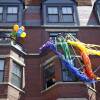Since 1978, Judy Lippke hasn’t missed a Pride festival in Boston, and this year is no different — though Pride itself has changed.
Lippke was among the throngs of people who gathered on Boston Common on Sunday for Pop-Up Pride. On a small stage drag queens, musicians and activists performed amid a sea of rainbow flags and glitter-painted faces. The grassroots celebration rose from the ashes of the now-disbanded Boston Pride tradition.
“I would like to see this event grow bigger, and I certainly don't want to return to a parade of bank floats,” Lippke, a 73-year-old Brookline resident, said. “Over the years Boston Pride became much more politicized and less reflective of the gay community of Greater Boston.”
With an array of smaller events across the city, Boston is marking Pride Month for the first time since the organization Boston Pride disbanded last July amid calls for inclusivity and growing criticism over the corporatization of the annual parade.
“It is clear to us that our community needs and wants change without the involvement of Boston Pride,” the nonprofit’s Board of Directors said in a statement posted online last summer, announcing the end of all planned events and a dissolution of the organization. “We have heard the concerns of the [Queer and Transgender People of Color] community and others. We care too much to stand in the way.”

The end of Boston Pride opened up a new opportunity to reimagine what Pride Month celebrations could look like in the city, with an emphasis on local performers and support from nonprofits, said Andre Isaacs, an emcee at Pop-Up Pride.
“Once it was dismantled, communities who didn’t feel represented by the corporatization of Pride and the direction it was going came together to create something that reflects the community,” Isaacs said. “We imagined a grassroots Pride, something that reflects the will of the people, where people actually feel that this is for them and by them.”
Isaacs, who moved from Kingston, Jamaica to Jamaica Plain, says Pride celebrations in Boston haven’t always felt welcoming for people like him.
“As a queer, Black immigrant living in Boston, in the United States in general, it has been difficult at times to feel like a part of the community in terms of representation,” Isaacs said. “Even at Pride, which is a space we would hope would be more welcoming. I definitely feel a lot more excited about this event than I have about the generalized Pride events in the past.”
Among the local performers, was Jameel Johnson, a 27-year-old Roxbury native and singer-songwriter who performs under the name Karim .
“You can see there's definitely a more diverse crowd out here, a lot more Black and Brown people like myself, a lot of young people and their parents,” Johnson said. “That’s wonderful to see.”

Pop-Up Pride came together in three months, lead organizer Jo Trigilio said, with financial help from nonprofits, local businesses and the Eastern Bank Charitable Foundation, a Boston-based nonprofit with a longtime involvement in Pride celebrations.
“I'm not necessarily anti-corporate, but I think that because LGBTQ people's rights are in jeopardy and we're under attack, this is really not the time for companies and corporations to treat us as a market and use pride as a marketing opportunity.” Trigilio continues, “It's kind of offensive to use us as a marketing opportunity when we're trying to gather together because we're under attack and our youth are under attack.” Trigillo is referring to the wave of anti-LGBTQ legislation that's sweeping the country.
When Trigilio moved to Boston in 1998, “I was a little bit surprised at how commercialized Pride was here, and male centered,” she said. Trigilio’s response was to join the organizing committee for the Boston Dyke March, which celebrated its 25th anniversary on Friday .
“That felt more authentic to me, you know, we were doing it grassroots,” she said.
Pop-Up Pride was created in the same spirit, Trigilio said.
“This is the future,” she said. “This is what it looks like to have a community-centered Pride.”
This year’s celebrations come after years of growing tension between organizers at Boston Pride and other groups, including Trigilio, who was accused by Boston Pride organizers of infringing on their name after creating Boston Pride 4 The People in 2020. Due to COVID-19 concerns, Boston Pride in 2020 and 2021 were both canceled.

Taking in Pop-Up Pride were Quincy residents, Rob Phelps and Jim Dalgish, who have been a couple for 30 years. Jim Dalgish says he recognizes the enduring importance of Pride, “As a kid in the early 80s, it was dangerous to do this. I don't [any longer] want it to be an act of courage. I want it to be a celebration! In this political climate, I feel like this could be going away.”
After attending her last Pride celebration in 2018, Quincy resident Ariana Fugoso, 25, says she was hoping for a bigger post-pandemic comeback this year.
“Of course it's good with local people and it's nice that we're all gathered here together, but I still miss the big celebration with the whole city involved,” Fugoso said. “But again, with everything that's happened, I guess, you know, this works.”
Judy Lippke says she also misses the all-encompassing, city-wide, confetti-on-every-street Pride celebrations of the past, something she’s hoping the new wave will grow into in coming years.
“It was sad that the Pride committee couldn't work out a way to be more diversified and work out their differences, but I do think it’s great that this Pop Up Pride has appeared,” she said. “I hope that we can develop a bigger gay Pride event that is not corporate and that is more grassroots and respectful of all of our all of the different people in our community, all the cultural diversity that we have.”








